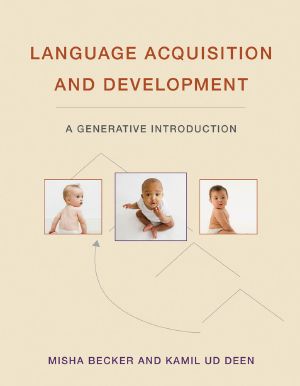Language Acquisition and Development, A Generative Introduction

- Authors
- Becker, Misha
- Publisher
- MIT Press
- Tags
- language acquisition; child language; universal grammar; generative; linguistics; syntax; morphology; phonetics; phonology; telegraphic speech; roger brown; noam chomsky; luigi rizzi; nina hyams; ken wexler; bilingualism; language disorders; binding principles; principle a; principle b; principle c; null subjects; truncation; bootstrapping; optional infinitives; passive voice; poverty of the stimulus; logical problem of language acquisition; developmental problem of language acquisition; specific language impairment; autism; critical period; experimental methods; ipa; negation; questions; relative clauses; induction; continuity; statistical tracking; constructivism; speech perception; voice onset time; speech segmentation; stress; rhythm; prosody; phonotactics; pre-vocal speech; phoneme; substitution; assimilation; constraints; vocabulary spurt; underextension; overextension; fast mapping; ostension; gavagai; whole object assumption; principle of mutual exclusivity; mean length of utterance; mlu; suffix; prefix; wug test; overregularization; u-shaped development; errors of omission; errors of commission; functional structure; optional infinitive; root infinitive; truncation hypothesis; feral children; genie; chelsea; deaf children; asl; blind children; specific language impairment; sli; hemispherectomy; simultaneous bilingualism; single system hypothesis; separate system hypothesis; interdependent systems hypothesis; successive bilingualism; language attrition; heritage language; endangered languages; language revitalization
- Date
- 2020-03-10T00:00:00+00:00
- Size
- 9.00 MB
- Lang
- en
An introduction to the study of children's language development that provides a uniquely accessible perspective on generative/universal grammar-based approaches. How children acquire language so quickly, easily, and uniformly is one of the great mysteries of the human experience. The theory of Universal Grammar suggests that one reason for the relative ease of early language acquisition is that children are born with a predisposition to create a grammar. This textbook offers an introduction to the study of children's acquisition and development of language from a generative/universal grammar-based theoretical perspective, providing comprehensive coverage of children's acquisition while presenting core concepts crucial to understanding generative linguistics more broadly.
After laying the theoretical groundwork, including consideration of alternative frameworks, the book explores the development of the sound system of language--children's perception and production of speech sound; examines how words are learned (lexical semantics) and how words are formed (morphology); investigates sentence structure (syntax), including argument structure, functional structure, and tense; considers such "nontypical" circumstances as acquiring a first language past infancy and early childhood, without the abilities to hear or see, and with certain cognitive disorders; and studies bilingual language acquisition, both simultaneously and in sequence.
Each chapter offers a summary section, suggestions for further reading, and exercises designed to test students' understanding of the material and provide opportunities to practice analyzing children's language. Appendixes provide charts of the International Phonetic Alphabet (with links to websites that allow students to listen to the sounds associated with these symbols) and a summary of selected experimental methodologies.